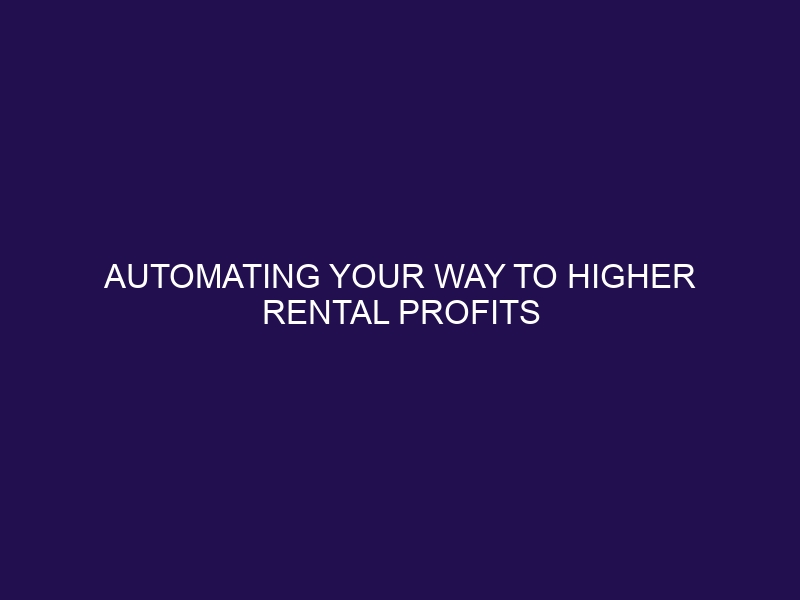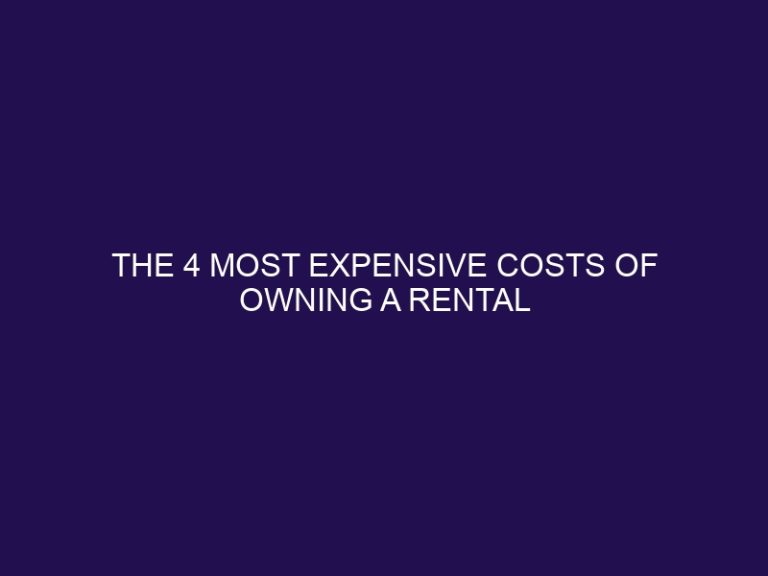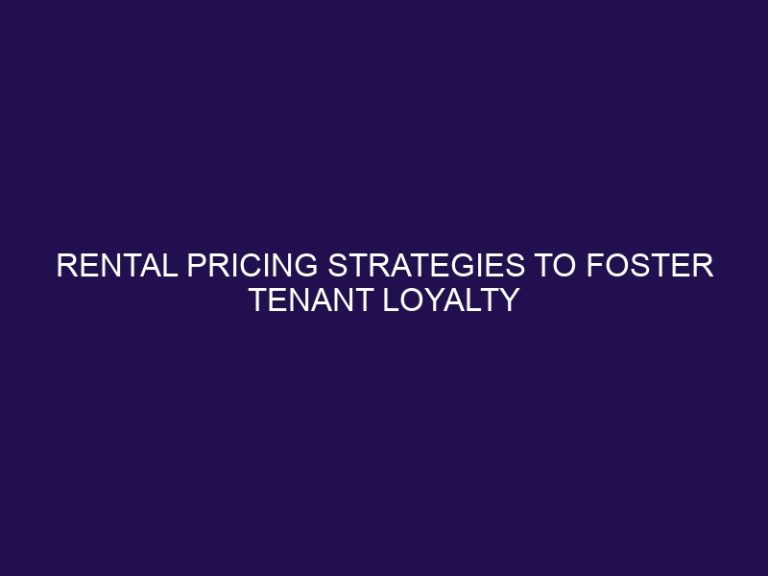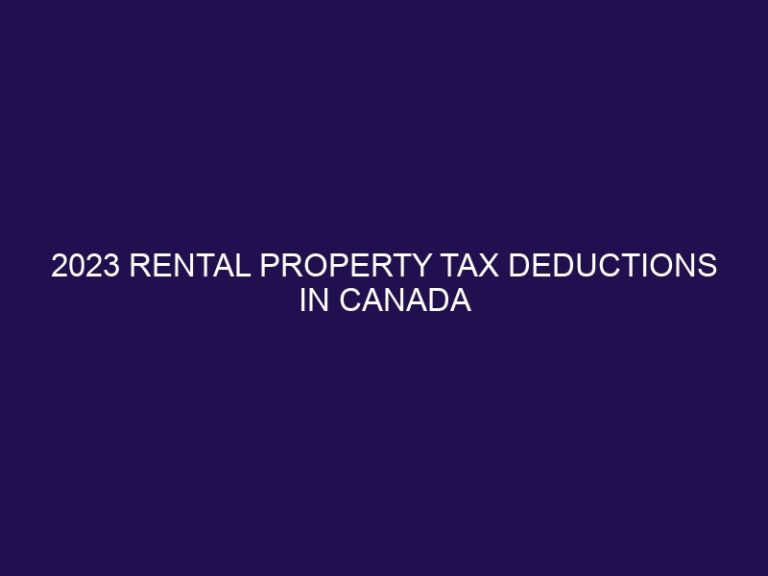Automating Your Way to Higher Rental Profits
Automation is the process of using technology to perform tasks that were previously done manually. In the rental industry, automation refers to using software and technology to streamline and simplify various processes involved in managing rental properties. It is becoming increasingly important for rental businesses to embrace automation in order to increase profits and improve efficiency.
According to a study conducted by Rentec Direct, rental businesses that adopt automation see an average increase of 20% in profits. This is because automation allows for more efficient use of resources and eliminates the risk of human error. Automation can be applied to various areas of rental business, such as:
- Online bookings
- Rent collection
- Property maintenance
- Communication with tenants and guests
The benefits of automating rental processes are numerous. Firstly, it saves time and effort for rental businesses, allowing them to focus on other important tasks. It also reduces the chances of human error, ensuring accuracy and efficiency in tasks such as rent collection and property maintenance. Automation can also improve the customer experience by providing a seamless and efficient process for booking and communication. Additionally, it increases overall efficiency and productivity for rental businesses.
However, implementing automation in rental business can come with its own set of challenges. The initial investment and setup costs can be a barrier for smaller rental businesses. There may also be technical difficulties and a learning curve for employees who are not familiar with the new technology. Resistance from employees or tenants may also pose a challenge in the adoption of automation.
There are various tools and software available for rental businesses to automate their processes. Online booking and reservation systems, property management software, smart home technology, and automated communication platforms are some examples of automation tools that can be used. These tools can help rental businesses save time, reduce costs, and improve efficiency in their operations.
In conclusion, automation is increasingly becoming a crucial aspect in the rental industry. By embracing automation, rental businesses can automate various processes, increase profits, and improve overall efficiency. Despite some challenges, the benefits of automation make it a valuable investment for rental businesses.
What Is Automation in the Rental Industry?
What Is Automation in the Rental Industry?
Automation in the rental industry refers to the use of technology to streamline processes such as property management, tenant communication, and rent collection. By automating these tasks, it can improve efficiency, reduce manual work, and enhance the overall tenant experience. One can also consider implementing automated rent reminders, maintenance requests, and lease renewals for optimal results.
Why Is Automation Important for Rental Profits?
Automation plays a crucial role in maximizing rental profits as it simplifies processes, minimizes mistakes, and improves efficiency. By automating tasks such as collecting rent, handling maintenance requests, and screening tenants, property owners can save valuable time and resources, resulting in higher profitability and greater tenant satisfaction.
What Are the Areas of Rental Business That Can Be Automated?
As a rental business owner, your time is valuable and should be spent on tasks that directly contribute to increasing your profits. That’s why it’s important to identify areas within your rental business that can be automated. In this section, we will discuss the different aspects of rental business that can benefit from automation, including online bookings and reservations, rent collection and payment processing, property maintenance and repairs, and communication with tenants and guests. Let’s dive in to discover how automating these processes can lead to higher rental profits.
1. Online Bookings and Reservations
- Implement an online booking system to enable round-the-clock access for reservations.
- Incorporate a user-friendly interface for effortless navigation and booking procedures.
- Provide secure payment processing for reservations to establish trust with customers.
- Automate confirmation emails and reminders for seamless communication with customers.
2. Rent Collection and Payment Processing
- Implement an online payment system for convenience.
- Set up automated rent reminders to reduce late payments.
- Utilize rental management software for seamless payment processing.
- Offer multiple payment options such as credit/debit cards, ACH, and online transfers.
Automating rent collection and payment processing is crucial for streamlining operations, enhancing tenant satisfaction, and boosting rental profits.
3. Property Maintenance and Repairs
- Regular Inspections: Schedule routine checks to identify and address maintenance needs promptly.
- Timely Repairs: Swiftly fix any reported issues to ensure tenant satisfaction and property upkeep.
- Vendor Coordination: Streamline communication and agreements with reliable maintenance professionals.
- Record-Keeping: Maintain organized documentation of all property repairs and maintenance activities.
Did you know? Regular maintenance and repairs can increase the value of your property and attract high-quality tenants.
4. Communication with Tenants and Guests
- Utilize automated messaging for rental updates and guest communications.
- Implement smart locks and keyless entry systems for seamless guest access.
- Employ chatbots for instant responses to tenant inquiries and requests.
- Integrate automated feedback collection for enhanced guest satisfaction.
What Are the Benefits of Automating Rental Processes?
As a rental property owner or manager, you know how time-consuming and tedious it can be to manage and track all aspects of your rentals. Luckily, there is a solution – automation. In this section, we will discuss the numerous benefits of automating rental processes. From saving time and effort to improving customer experience, automation can greatly enhance your rental business. Let’s delve into the specific advantages that automation brings to the table.
1. Saves Time and Effort
- Make use of property management software to automate administrative tasks and streamline operations, ultimately saving time and effort.
- Implement online booking systems to reduce the need for manual reservation management, resulting in less time and effort spent on this task.
- Integrate smart home technology for automated property maintenance, ultimately enhancing efficiency and reducing the time and effort required for property upkeep.
- Utilize automated communication platforms for seamless tenant interactions, leading to enhanced productivity and less time and effort spent on communication tasks.
True history: In the 20th century, the invention of the assembly line by Henry Ford revolutionized manufacturing, saving time and effort while increasing productivity.
2. Reduces Human Error
- Implement automated rent collection systems to eliminate human errors in manual record-keeping.
- Utilize property management software for accurate tenant data and billing.
- Integrate smart home technology to automate maintenance alerts, reducing oversight errors.
Embracing automation helps reduce human errors, ensuring smooth operations and tenant satisfaction.
3. Improves Customer Experience
- Streamlined Check-In/Out Processes
- Personalized Guest Communications
- Efficient Issue Resolution
- Enhanced Property Amenities
- Improves Customer Experience
4. Increases Efficiency and Productivity
- Implement streamlined processes for task allocation and tracking to increase efficiency and productivity.
- Utilize automation tools to reduce manual workload for employees and improve efficiency.
- Integrate digital solutions to optimize resource allocation and boost productivity.
What Are the Challenges of Implementing Automation in Rental Business?
As technology continues to advance, more and more rental businesses are turning to automation to streamline their operations and increase profitability. However, implementing automation comes with its own set of challenges. In this section, we will discuss the main hurdles that rental businesses may face when implementing automation. From initial investment and setup costs to technical difficulties and potential resistance from employees or tenants, we will explore the key challenges that must be navigated in order to successfully automate your rental business.
1. Initial Investment and Setup Costs
- Assess the cost of automation tools and software.
- Research potential initial investment and setup requirements for implementation and training.
- Consider long-term cost savings compared to upfront expenses.
Did you know? Implementing automation can result in a 25% reduction in operational costs.
2. Technical Difficulties and Learning Curve
- Training: Offer thorough training to employees on new systems to help them adapt.
- Support: Provide ongoing technical support to address any technical difficulties that may arise.
- Feedback: Encourage employees to provide feedback to improve the automation process and overcome any initial learning curve.
Embracing automation may initially pose technical challenges, but with the right support and feedback, these hurdles can be overcome for a more efficient rental business.
3. Resistance from Employees or Tenants
- Educate: Provide comprehensive training and resources to alleviate concerns and address resistance from employees or tenants.
- Engage: Involve employees and tenants in the decision-making process to address their apprehensions and overcome resistance.
- Communicate: Clearly convey the benefits of automation to gain buy-in and cooperation and combat any resistance from employees or tenants.
What Are Some Examples of Automation Tools for Rental Business?
As a rental business owner, maximizing profits while minimizing workload is crucial for success. One way to achieve this is through automation tools, which can streamline and simplify various tasks. In this section, we will discuss some examples of automation tools that can benefit rental businesses. From online booking and reservation systems to smart home technology, these tools can help save time and effort, allowing owners to focus on other aspects of their business.
1. Online Booking and Reservation Systems
- Simplify the booking process for customers with our online booking and reservation systems.
- Allow 24/7 access to our reservation facilities.
- Securely integrate payment gateways for hassle-free transactions.
- Automatically send confirmation and reminder emails to customers.
- Efficiently provide real-time updates on property availability.
2. Property Management Software
Property management software is designed to streamline tasks such as lease tracking, maintenance requests, and financial reporting. Some popular examples of this type of software include Buildium, AppFolio, and Rent Manager, all of which offer features like online rent payment, tenant screening, and property accounting.
3. Smart Home Technology
- Automate thermostat and lighting control for energy efficiency with the use of smart home technology.
- Implement smart locks and security systems to seamlessly manage access to the property.
- Utilize smart sensors to monitor property conditions and detect any potential issues.
- Integrate virtual assistants to automate guest interactions and provide information about the property through the use of smart home technology.
4. Automated Communication Platforms
- Incorporate automated communication platforms to ensure seamless tenant communication, including rent reminders and maintenance updates.
- Utilize chatbots to efficiently handle tenant inquiries and provide quick responses.
- Implement automated messaging systems to send notifications about property events or community updates.
True story: One property management company saw a 20% increase in tenant satisfaction after integrating an automated communication platform for prompt issue resolution and proactive updates.
Frequently Asked Questions
What are the financial benefits of automating a rental business?
Automation can save time and cost by eliminating mundane tasks and reducing data entry errors. This can result in increased efficiency, higher profits, and the ability to scale the business. It can also improve accuracy and compliance, making audits and taxes less complex.
How can automation help in managing inventory in a rental business?
Automated inventory management can save time and effort by seamlessly integrating data from different sources, reducing the chance of errors. It can also provide real-time data points and insights to make informed decisions about target profit and managing heavy equipment.
What are some ways automation can save time in a rental business?
Automation can save time by eliminating repetitive tasks such as rent renewals and managing inventory. It can also reduce the time taken for regulatory compliance and income reports, freeing up time for other important tasks.
How can automation improve customer satisfaction in a rental business?
Automation can improve customer satisfaction by making the payment process easier through electronic payments and recurring scheduled payments. It can also improve communication with tenants through tools like email and text messaging.
What are some industry trends related to automating rental businesses?
In the real estate industry, automation is becoming a necessary and scarce commodity. Private landlords and property managers are increasingly utilizing automation to save time, increase efficiency, and stay ahead of the competition. Software programs specifically designed for rental businesses, such as accounting software, are also gaining popularity.
How can automating a rental business help in gathering information and making informed decisions?
Automation can gather and compile data points from various sources, providing a comprehensive view of the business. This data can then be used to make informed decisions about target profit, managing inventory, and improving processes.







